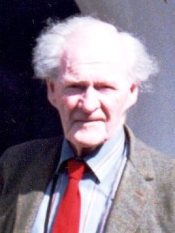I began collecting the works of R. S. Thomas when a wincing checkbook convinced me to stop collecting the works of Robert Frost. Here’s the story:
It was sometime in the 1950s, either in college or theological school, that Frost’s poems began to colonize my imagination. This reading moved into collecting when a parishioner transferred a treasure from her library to mine. The book is a signed copy of Frost’s 1936 volume of poems titled A Further Range. Just below Frost’s signature, the woman who gave me the book has written: “To the Rev. John Galen McEllhenney from Helen A. Tyson, March 1, 1968.”
For a number of years before Helen gave me A Further Range, I’d been learning about book collecting from Frederick E. Maser, a Methodist minister who was known for occasionally wearing a black suit, a black silk shirt unbuttoned almost to his navel, and a gold necklace. Flamboyant or not, Fred Maser was an exceptionally knowledgeable book buyer.
I learned from Fred to buy books, not because you hoped they’d be an investment increasing in value, but because you loved books. Pick your ‘topic’ – an author, such as Frost, or a category, such as Maser’s Bible collection. And don’t spend more than you can afford.
And so, about 1969, I started collecting the works of Robert Frost. Book stories became my bars. Every time I was in Philadelphia, I hurried to Sessler’s on Walnut Street for a conversation with Mabel Zahn, who usually worked with high-net-worth collectors, but who was willing to be on the lookout for Frost items I could afford.
Also, I haunted secondhand shops, got on the mailing lists of rare book dealers in the United States, and checked the shelves of bookstores in Cambridge, England, when I was there during the summer of 1976. All the while, I was adding both new and used secondary Frost materials to my collection, and started gathering Frost’s Christmas cards.
Eventually, by the late 1970s, I had all the Frost items I could afford; first editions of his earliest books were out of my reach. So I turned my attention to R. S. Thomas. Because he was still living, his books were affordable . . . although the prices I had to pay for his earliest three books and two very limited editions did cause my bank account to wince.
Now, forty years later, my R. S. Thomas collection lives in the special collections section of Drew University’s library, along with several of Fred Maser’s collections.










